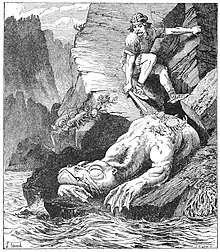The Norka
The Norka (Russian: Норка-зверь) is a fairy tale from Andrew Lang's The Red Fairy Book. Lang gives no source for the tale, but it is taken verbatim from the book Russian Folk-tales by W. R. S. Ralston, published in 1873 by Smith, Elder, & co. and re-published by Kessinger Publishing in 2004.

The King is unable to destroy the Norka, a huge beast who is devouring his animals. He offers half his kingdom to any one of his sons who kills the Norka. The two eldest sons drink and revel instead of hunting the beast. The youngest third son, a simpleton, wounds and chases the beast. The beast escapes under a great stone. The third son descends to the underworld and meets a talking horse who calls him Ivan and takes him to a copper palace owned by a beautiful woman, a sister of the Norka. He travels to a silver palace and a golden palace, also owned by the sisters of the Norka. The third and youngest sister tells him that Norka is asleep on the sea. She gives him a sword and the Water of Strength, and tells him to cut off her brother's head with a single stroke. He cuts off the Norka's head, which says "Well, I'm done for now!", and rolls into the sea.
The three sisters are in love with him, so he takes them with him to the surface world. They change their palaces into eggs with magic, teach him how to do it, and give him the eggs. His brothers pull the three maidens up, but try to kill the third son by cutting the rope halfway up. He substituted a stone for himself, however, so he was not killed. Stranded in the underworld, he sadly wandered away as it rains. He covers some baby birds with his coat to protect them from the rain. The giant mother bird is grateful and carries him to the surface.
A tailor tells him that the two princes are going to marry the maidens from the underworld, but the maidens refuse to be married until wedding dresses are made in the underworld style, and without measuring them. The third son tells the tailor to accept the job to make the clothes for the wedding. At night, the third son turns the eggs into palaces, takes the maiden's clothes from the palaces, and turns the palaces into eggs again. He gives the dresses to the tailor who is paid richly by the King. He visits the shoemaker and other artificers and does the same thing. The youngest maiden recognizes him (in rags), grabs him, and takes him to the palace. She explains to the king what happened and that the brothers threatened to kill them if they said the third son was alive. The King punishes the two brothers. Three weddings are celebrated.